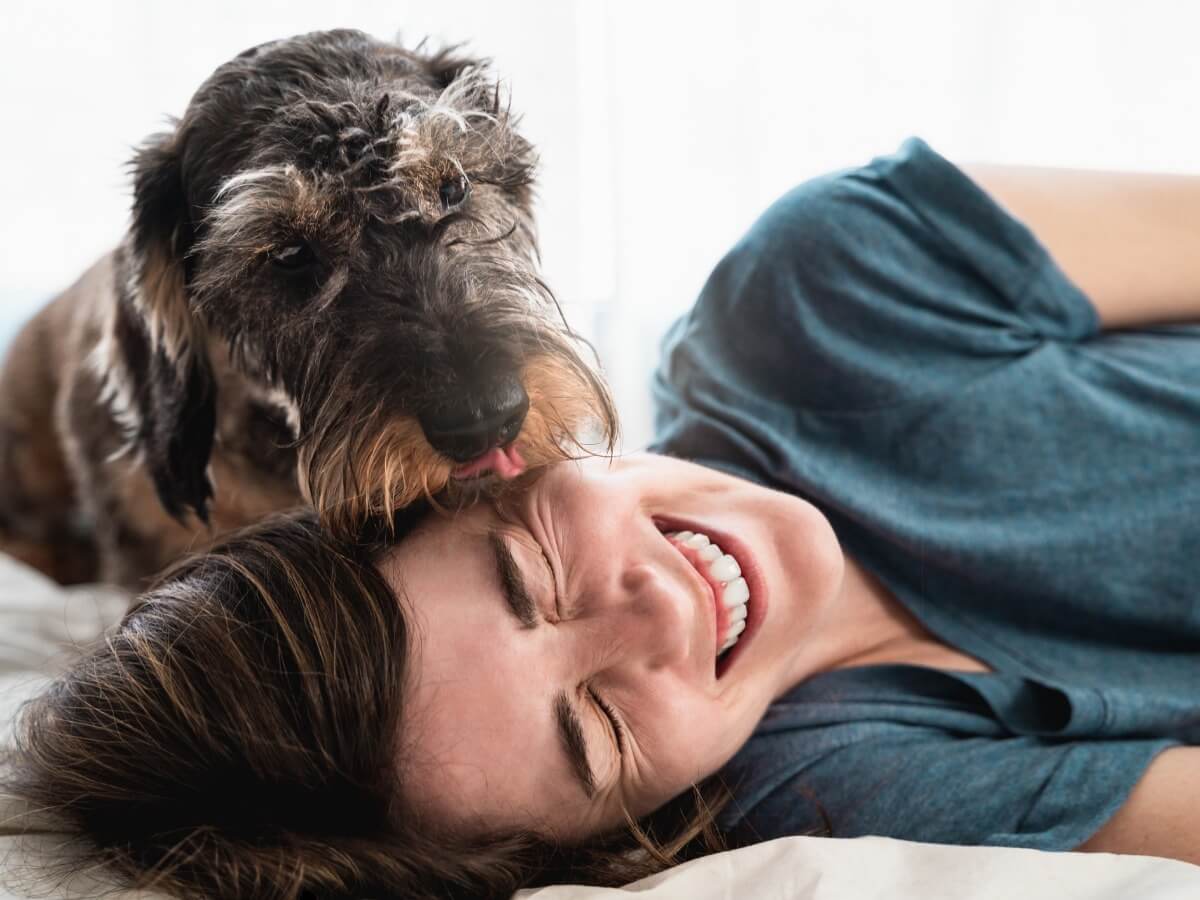My Dog is Hiding from Me and Acting Strange: What Should I Do?


Written and verified by the biologist Samuel Sanchez
Dogs are often a mystery for humans, as they can go from being the joyful center of the household to a shadow that’s barely visible. If your dog is hiding and acting strange, it may be that it has a physical illness, a behavior problem, or that its personality has changed over time.
Dismissing these behaviors with phrases like “that’s just the way he is” or “she’s just getting old” is never an option. As social beings that they are, dogs seek affection and unity, even if only sporadically. If your pet hides from you all the time and is acting suspiciously, you’re looking at abnormal behavior, and in the following article, we’ll show you how to solve it.
The sociality of dogs and human beings
Dogs are social animals by nature, so seclusion and isolation aren’t in their genes. The ancestors of this species were social canines that lived in family units (hierarchies) with parental figures as guides. More than “establishing dominance,” these animals learned and cared for each other by recognizing their role in the grouping.
During the first 3-8 weeks of their life, puppies focus their attention and interaction on other dogs. Then, from 5-12 weeks, they begin to manufacture their unique language with human beings. Since the domestication of dogs more than 10,000 years ago, both species (dog and human) have adapted both behaviorally and genetically to understand one another.
As indicated by professional sources, when a guardian looks a dog in the eye, peaks of oxytocin are produced in both parties, a hormone involved in processes of trust, generosity, and well-being. This means that it makes no sense for a dog to hide from its owner, as at a physiological level, contact with them should generate positive reactions.
The contact of a dog with its guardian generates positive reactions in both parties at both the hormonal and brain levels.

Why is my dog hiding from me?
If a dog is a social being by nature and interacting with you generates peaks of well-being, then it’s perfectly normal for you to wonder why your dog is suddenly hiding from you or if they maintain this behavior over time. Before you become alarmed, ask yourself the following:
- Has something changed in the environment in recent times?: The hearing of dogs is more than two times higher than ours, and their smell is superior to that of the human species in several ways. Therefore, it’s possible that a change that’s imperceptible for you (aromas, beeps, street noises, and others) becomes a big problem for your pet.
- How old is the animal?: A change in behavior is interpreted differently depending on the dog’s age.
- Are there other symptoms? If your dog is hiding from you and licking some part of its body obsessively, vomiting, bleeding, or losing weight, it’s definitely time to go to the vet.
- What time of year is it? Most female dogs go into heat two times a year (every six months). Perhaps this strange behavior has to do with your dog’s hormonal changes.
It’s important that you ask yourself all these questions, as it can be very useful and save time for professionals when visiting a veterinarian. Here are some of the reasons that could explain why your dog is hiding and acting strange. Do not miss it.
The animal is sick
When they feel ill, social animals tend to withdraw from the group and be much more elusive. It’s also possible that they become somewhat aggressive, as they feel vulnerable and will perceive any sound, visit, or touch that takes them by surprise as a danger.
If your dog is hiding from you and is sick, it’s normal to observe other symptoms accompanying this behavior, such as weight loss, vomiting, diarrhea, whining, lameness, yellowish eyes (jaundice), bleeding in the stool, and much more. Be especially careful if the dog is older, as at this stage, diseases such as cancer are quite common.
Your dog is afraid
This is one of the most frequent reasons for the behavior that concerns us here, especially if the dog is young. Your pet may be afraid of humans due to previous trauma, other animals due to lack of exposure, street noise, or any other stimulus that’s difficult for you to perceive. This chronic fear is common in animals that come from foster care or that haven’t socialized well since the time they were puppies.
Fear in dogs is usually accompanied by tremors, panting, excessive salivation, submission position (tail between the legs and a lowered head), and avoidance of eye contact. If your pet is suspicious of all its surroundings, no matter how much you change it, it’s most likely that you’ll need help from a canine educator.
It has cognitive dysfunction
Dogs can experience something similar to human senile dementia as they age. Approximately 62% of dogs older than ten years suffer from age-related cognitive dysfunction syndrome, so it’s a condition to be suspected when your pet is older and its behavior changes progressively.
Some of the symptoms derived from the degradation of the nervous system are changes in temperament, avoidance of stimuli, changed sleep schedule, lack of sphincter control, and confusion when recognizing members of the family group. Although this condition has no solution, the quality of life of the animal can be improved with the help of the veterinarian.
Something catches their attention
Sometimes, the fact that a dog is hiding doesn’t have to do with a negative stimulus, but with something that catches its attention in a specific part of the house. Therefore, if it’s constantly under the bed or behind a piece of furniture, you should thoroughly check what’s surrounding the area, including the floor and the wall.
The animal may have hidden a toy and can’t retrieve it, a field mouse has crept into your home, or a very stimulating smell for the canine emanates from that area (for whatever reason). The process of correcting this behavior involves, as always, positive reinforcement: Don’t encourage negative behavior, and reward the animal when it stops carrying it out.

As you can see, tons of stressors can cause your dog to hide from you. If it’s something sporadic, you shouldn’t worry, but in case the behavior is maintained over time, the best thing you can do is seek professional help. In the case of illness, early detection can be the difference between life and death.
Dogs are often a mystery for humans, as they can go from being the joyful center of the household to a shadow that’s barely visible. If your dog is hiding and acting strange, it may be that it has a physical illness, a behavior problem, or that its personality has changed over time.
Dismissing these behaviors with phrases like “that’s just the way he is” or “she’s just getting old” is never an option. As social beings that they are, dogs seek affection and unity, even if only sporadically. If your pet hides from you all the time and is acting suspiciously, you’re looking at abnormal behavior, and in the following article, we’ll show you how to solve it.
The sociality of dogs and human beings
Dogs are social animals by nature, so seclusion and isolation aren’t in their genes. The ancestors of this species were social canines that lived in family units (hierarchies) with parental figures as guides. More than “establishing dominance,” these animals learned and cared for each other by recognizing their role in the grouping.
During the first 3-8 weeks of their life, puppies focus their attention and interaction on other dogs. Then, from 5-12 weeks, they begin to manufacture their unique language with human beings. Since the domestication of dogs more than 10,000 years ago, both species (dog and human) have adapted both behaviorally and genetically to understand one another.
As indicated by professional sources, when a guardian looks a dog in the eye, peaks of oxytocin are produced in both parties, a hormone involved in processes of trust, generosity, and well-being. This means that it makes no sense for a dog to hide from its owner, as at a physiological level, contact with them should generate positive reactions.
The contact of a dog with its guardian generates positive reactions in both parties at both the hormonal and brain levels.

Why is my dog hiding from me?
If a dog is a social being by nature and interacting with you generates peaks of well-being, then it’s perfectly normal for you to wonder why your dog is suddenly hiding from you or if they maintain this behavior over time. Before you become alarmed, ask yourself the following:
- Has something changed in the environment in recent times?: The hearing of dogs is more than two times higher than ours, and their smell is superior to that of the human species in several ways. Therefore, it’s possible that a change that’s imperceptible for you (aromas, beeps, street noises, and others) becomes a big problem for your pet.
- How old is the animal?: A change in behavior is interpreted differently depending on the dog’s age.
- Are there other symptoms? If your dog is hiding from you and licking some part of its body obsessively, vomiting, bleeding, or losing weight, it’s definitely time to go to the vet.
- What time of year is it? Most female dogs go into heat two times a year (every six months). Perhaps this strange behavior has to do with your dog’s hormonal changes.
It’s important that you ask yourself all these questions, as it can be very useful and save time for professionals when visiting a veterinarian. Here are some of the reasons that could explain why your dog is hiding and acting strange. Do not miss it.
The animal is sick
When they feel ill, social animals tend to withdraw from the group and be much more elusive. It’s also possible that they become somewhat aggressive, as they feel vulnerable and will perceive any sound, visit, or touch that takes them by surprise as a danger.
If your dog is hiding from you and is sick, it’s normal to observe other symptoms accompanying this behavior, such as weight loss, vomiting, diarrhea, whining, lameness, yellowish eyes (jaundice), bleeding in the stool, and much more. Be especially careful if the dog is older, as at this stage, diseases such as cancer are quite common.
Your dog is afraid
This is one of the most frequent reasons for the behavior that concerns us here, especially if the dog is young. Your pet may be afraid of humans due to previous trauma, other animals due to lack of exposure, street noise, or any other stimulus that’s difficult for you to perceive. This chronic fear is common in animals that come from foster care or that haven’t socialized well since the time they were puppies.
Fear in dogs is usually accompanied by tremors, panting, excessive salivation, submission position (tail between the legs and a lowered head), and avoidance of eye contact. If your pet is suspicious of all its surroundings, no matter how much you change it, it’s most likely that you’ll need help from a canine educator.
It has cognitive dysfunction
Dogs can experience something similar to human senile dementia as they age. Approximately 62% of dogs older than ten years suffer from age-related cognitive dysfunction syndrome, so it’s a condition to be suspected when your pet is older and its behavior changes progressively.
Some of the symptoms derived from the degradation of the nervous system are changes in temperament, avoidance of stimuli, changed sleep schedule, lack of sphincter control, and confusion when recognizing members of the family group. Although this condition has no solution, the quality of life of the animal can be improved with the help of the veterinarian.
Something catches their attention
Sometimes, the fact that a dog is hiding doesn’t have to do with a negative stimulus, but with something that catches its attention in a specific part of the house. Therefore, if it’s constantly under the bed or behind a piece of furniture, you should thoroughly check what’s surrounding the area, including the floor and the wall.
The animal may have hidden a toy and can’t retrieve it, a field mouse has crept into your home, or a very stimulating smell for the canine emanates from that area (for whatever reason). The process of correcting this behavior involves, as always, positive reinforcement: Don’t encourage negative behavior, and reward the animal when it stops carrying it out.

As you can see, tons of stressors can cause your dog to hide from you. If it’s something sporadic, you shouldn’t worry, but in case the behavior is maintained over time, the best thing you can do is seek professional help. In the case of illness, early detection can be the difference between life and death.
All cited sources were thoroughly reviewed by our team to ensure their quality, reliability, currency, and validity. The bibliography of this article was considered reliable and of academic or scientific accuracy.
- Disfunción cognitiva en perros: la demencia senil canina. Clínica Veterinaria Rioseco. Recogido a 8 de septiembre en https://riosecoclinicaveterinaria.es/disfuncion-cognitiva-en-perros/
- Social behavior of dogs, MSD Veterinary Manuals. Recogido a 8 de agosto en https://www.msdvetmanual.com/behavior/normal-social-behavior-and-behavioral-problems-of-domestic-animals/social-behavior-of-dogs
- Why does my dog hide under the bed? AKC. Recogido a 8 de septiembre en https://www.akc.org/expert-advice/training/why-does-my-dog-hide-under-the-bed/
This text is provided for informational purposes only and does not replace consultation with a professional. If in doubt, consult your specialist.








